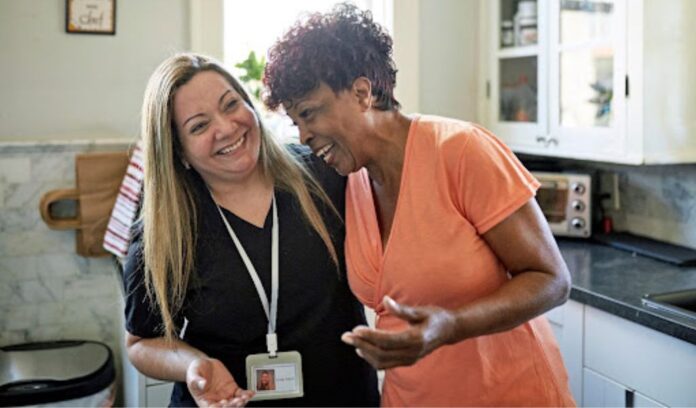Social work is a profession that focuses on promoting change and empowerment of people and the community. In the classroom, social workers are taught technical skills such as assessing clients, finding resources and utilizing various clinical interventions. However, you need more than these technical skills to be a competent social worker. That’s where soft skills come into the picture.
Soft skills are aptitudes that help you perform your career-related skills. These skills are not specific to any profession or position. For the most part, soft skills allow people to interact better with others. Because social work is a very interactive profession, it’s essential to master these skills if you want to pursue this career. Here are some of the most important soft skills a social worker should have.
Empathy
Empathy is the ability to emotionally understand what other people feel by putting yourself in their position. For instance, if you see someone struggling with addiction, you can envision yourself going through the same and feeling what they are feeling. Notably, there are three types of empathy. The first is affective empathy, which involves understanding someone else’s emotions and responding appropriately. The second type is somatic empathy, which involves physically responding to a situation. The last type is cognitive empathy, which is the ability to understand someone’s mental state and what they might be thinking in response to a particular situation.
When you have empathy as a social worker, you can build a stronger social connection with clients. You are able to better understand what they are going through and respond appropriately. Empathy also helps you learn to regulate your emotions and not get overwhelmed, even under stress.
As a social worker, you can practice empathy by approaching clients in a warm, inviting manner. Perhaps you can meet them in an environment that feels safe for them. You can then explain to the client how you can support them. Most importantly, listen without bias. Don’t let stereotypes get in the way of determining how someone will be treated.
While empathy is essential, watching out for its pitfalls is also vital. One of the potential risks of being an empath is suffering from empathy fatigue. This refers to the exhaustion you might experience – emotionally or physically – after frequent exposure to stressful or traumatic events. In addition, empathy can potentially affect your judgment as a social worker, causing you to go against professional ethics due to how you feel for someone else.
Most people believe that empathy is an inborn trait that cannot be taught. But what if we told you that it could? Research has shown that this skill can be taught to healthcare providers even though the capacity for it is inborn.
Communication
Effective communication is the heart of social work. We can see the importance of communication by answering the common question, “What does a clinical social worker do?” While it’s a broad profession, day-to-day work entails assessing people’s needs, strengths and wishes. Social workers come into direct contact with individuals and families in different settings, such as hospitals, community health centers and primary care offices. In all these settings, they spend much time communicating with their clients. Florida State University offers a clinically focused social work master’s program that prepares you to practice in these settings.
Every social worker needs the ability to communicate with people from diverse backgrounds. A lack of this crucial skill can have detrimental effects on clients. Notably, communication is a layered concept. It has aspects that include listening, speaking and observing.
Since social worker needs to interview clients, they need excellent listening skills. This may involve taking notes to ensure that they capture even the tiniest details. Being a good listener as a social worker also means being mindful of your reaction to the client’s words. You must ensure you don’t show disinterest or disagreement, such as rolling your eyes or yawning. Instead, it’s helpful to reassure the client that you are approachable. Some ways to do so include maintaining eye contact, keeping some distance to improve comfort and smiling to convey warmth.
Sometimes, a client might hesitate to disclose crucial information about their situation. Perhaps they are struggling with feelings of shame and guilt. However, a competent social worker with effective communication skills can figure out a way to get the necessary information. There are different ways to do this, including asking the right questions or switching to a different language.
A lack of trust is among the most significant barriers to effective communication between clients and social workers. A client can connect with the social worker if there is trust. As a social worker, you can build trust by reassuring clients that their experiences and feelings are valid. Another way of building trust is using relatable language – using jargon is most likely to increase the psychological distance between you and the client.
Besides talking to clients, a social worker must communicate with care providers and agencies. Therefore, they need strong written communication skills to write reports concisely. Mastering written communication is also essential when joining the workforce as a social worker. While the demand for social workers has increased over the past few years, you will still need a well-written resume and cover letter to catch the eye of a recruiter.
Cultural Competence
Millions of immigrants live in the United States. Therefore, a social worker should expect to meet people from diverse ethnic and cultural backgrounds.
Enter cultural competence. This is the ability to interact and develop meaningful relationships with people of various cultural backgrounds. As a social worker, you must be prepared to face ideas, beliefs and traditions you are unfamiliar with. When you have cultural competence, you can navigate these issues successfully. Cultural competence also gives you the prerequisite to help others acclimate to their communities.
Every social worker needs to make an ongoing effort to increase cultural competence. Even if you feel like you have a good grasp on concepts of diversity, it is a skill that calls for continuous improvement. One of the ways you can do so is by practicing cultural humility. Acknowledge that you cannot be an expert of knowledge in every culture and leave room for learning. Be willing to ask questions instead of making assumptions about your client’s cultural identity and background.
Self-awareness is also crucial. When you deepen your understanding of yourself, you can remain objective with clients. For instance, you can reflect on your personal biases, in which you look at things through the lens of your own experiences. Once you understand that the client also has their lenses, you can be more compassionate towards them.
Cultural contexts also go a long way in determining the right approach to situations. For instance, you might need to adjust the distance between you and the client when interviewing them, depending on their cultural background. That also applies to the choice of language and gestures.
Critical Thinking
Critical thinking refers to conceptualizing, applying, analyzing, synthesizing and evaluating new information. Social workers offer a wide range of services, such as counseling and housing assistance. They must remain objective to ensure their clients get as much help as possible. If social workers do not think critically, they might misunderstand or misjudge clients.
Fortunately, critical thinking is a skill you can develop and refine over time with practice. One way of doing so is developing a questioning mindset. Don’t jump to conclusions before asking probing questions. You can also refine your critical thinking skills by seeking diverse perspectives. Perhaps you can consult someone regarding a particular situation to hear how they would approach it. Keep an open mind even if their suggestions challenge your beliefs or values. It’s crucial to avoid confirmation bias, which is the tendency only to accept information from your preconceived notions.
Continuous engagement in professional development can also help you refine your critical thinking. Engagements such as conferences and workshops can help you learn about the latest research, best practices and ethical guidelines in your line of work. You can also collaborate with mentors and colleagues to critically discuss ethical dilemmas.
Patience
Sometimes, it takes time to see results in your clients. Usually, there are many stakeholders involved, such as agencies and organizations, which might slow down the process. Therefore, you need to be patient with the procedures.
As a social worker, you need heroic patience when dealing with clients. You will encounter clients who are going through difficult situations yet perhaps may not be so forthcoming with information. You have to move at their pace and respect their readiness for change. If you push them to make decisions faster or share information, they might develop resistance to the process. It is also important to acknowledge that it takes time to build rapport with clients. It requires patience to form a trusting relationship, especially if the client has experienced trauma.
Patience also helps navigate complex situations. When patient, you can carefully assess a situation, plan and execute the intervention steps. Sometimes, various stakeholders may have conflicting suggestions, but patience helps you remain calm and collected even amid conflict.
Self-care
One might think that it’s rather odd to think of self-care as a skill. Indeed, it’s a soft skill that is essential to social workers. We can define self-care as anything you can do to ensure you stay healthy physically, mentally and emotionally. Typically, the nature of social work practice can be demanding. You might find yourself working in an under-resourced area and with heavy caseloads, not to mention that a crisis can occur without warning.
Therefore, social workers are susceptible to issues such as burnout and stress. When you practice self-care, you can replenish your energy to maintain your emotional and mental well-being, which you need to do your job well. Some social work self-care practices, like relaxation techniques, can also help you build resilience that lets you bounce back from work challenges while maintaining a positive mindset. That goes a long way in helping you perform at your best and offer practical help to clients.
Another benefit of practicing self-care as a social worker is that you model healthy behavior to your clients. Remember that your clients may be looking up to you as far as general well-being goes.
In social work, you often encounter people facing challenging life circumstances. While you might be trained to separate yourself from their experiences, sometimes you can’t help it. That cumulative effect of witnessing the suffering of others can leave you with compassion fatigue and vicarious trauma. Fortunately, self-care practices can help you protect your well-being while maintaining your ability to demonstrate empathy towards your clients.
Additionally, engaging in self-care activities can help you maintain professionalism. When your emotions are regulated, you can make sound decisions and avoid crossing ethical and legal lines.
Time Management and Organization Skills
Social workers often have multiple tasks to manage, usually with limited resources and tight deadlines. Therefore, it’s essential to have time management and organization skills to ensure that each task is completed on time. When you manage time effectively, you can decide which tasks need immediate attention and which can be pushed without dire consequences.
Time management can also help you prevent burnout since you can schedule time for self-care and rest. With good time management skills, you can manage your workload better, thus achieving the much-needed work-life balance.
Organizational skills also come into play when handling information such as client records and case notes. When you are organized, you can keep track of important information and retrieve it quickly when needed.
Advocacy
The primary goals of social work are social justice, equality and the promotion of human dignity. Therefore, it is no surprise that advocacy is a fundamental skill for social workers. When you have strong advocacy skills, you can give a voice to marginalized communities. You can also help people confront their challenges amid barriers such as lack of education and economic status.
Notably, social work has two types of advocacy – case and cause. Case advocacy is a situation where the social worker is advocating for an individual client. For instance, the social worker can negotiate on behalf of a client to help them access medical care. They can step in to help a client when an insurance company denies their claim. To effectively advocate for individual clients, you must be conversant with the laws relevant to that case.
On the other hand, cause advocacy is a broader term and refers to an attempt by social workers to change the existing systems that prevent people from meeting their needs. For instance, a social worker might realize that the death rate during childbirth is higher among women of color due to substandard care. In response, the social worker can fight for a law that improves access to care for these women.
Flexibility and Adaptability
Social work is an incredibly dynamic profession. Each day, you face new challenges, and while there may be some similarities, there is always a layer of uniqueness to each case. That’s why you need to be flexible and adaptable. That way, you can handle changing and complex situations without being rigid in your approach and interventions.
Adaptability helps you handle client diversity better. As we mentioned earlier, you will meet clients from different cultural backgrounds. Therefore, it’s important to view every client as an individual and tailor interventions depending on their unique strengths and challenges.
It is also worth noting that this profession’s policies and procedures may change over time. Therefore, you must be flexible and adaptable to keep up with those changes. Sometimes, you might even need to go for training to learn new skills.
Flexibility and adaptability also play a crucial role in crises and emergencies. In such cases, the needs of communities may change rapidly, calling for a quick adjustment of your intervention plans. You’ll need to figure out innovative ways to solve problems since conventional ones might not be practical at that moment.
Collaboration and Teamwork
Social work often involves collaborating with various professionals and agencies to provide comprehensive services to clients. Therefore, a social worker needs to master working within a team. In addition, collaboration is a chance for mutual learning and professional growth. It also sets the foundation for systems-level interventions, such as policy advocacy and program development, which benefit society.
Furthermore, having strong collaboration and teamwork skills will help you network. You can develop and maintain professional relationships, which will come in handy when it comes to career advancement and lobbying for resources.
Sharpening your Soft Skills
Now that you’re familiar with the 10 essential soft skills a social worker should possess, you may have noticed some skills you could be lacking. However, there’s no need to worry. All you need to do is put conscious effort into sharpening that skill, and within no time, you will be a pro. As you learn, you can always ask for feedback from trusted friends or mentors to help you improve. Remember, it can be uncomfortable to learn a new skill. Therefore, be ready to step out of your comfort zone while extending some grace to yourself.



















![10 Countries With the Best Healthcare in the World [Statistical Analysis] Countries With the Best Healthcare in the World](https://articleify.com/wp-content/uploads/2025/07/Countries-With-the-Best-Healthcare-in-the-World-1-150x150.jpg)









